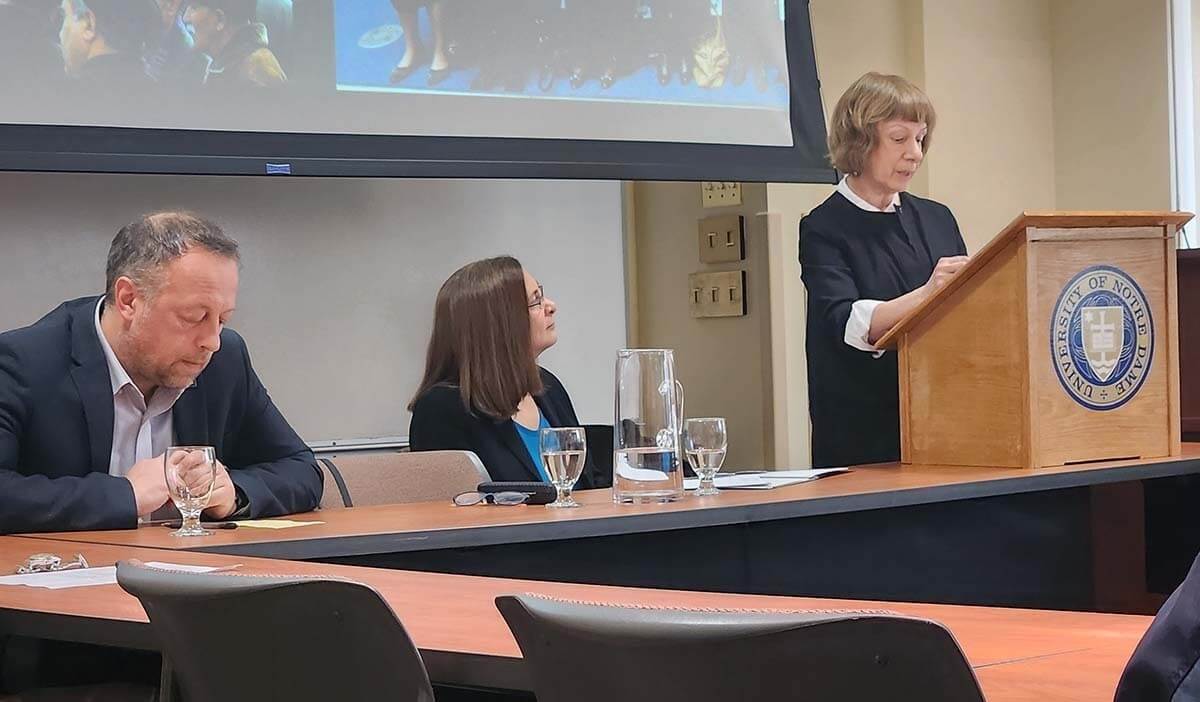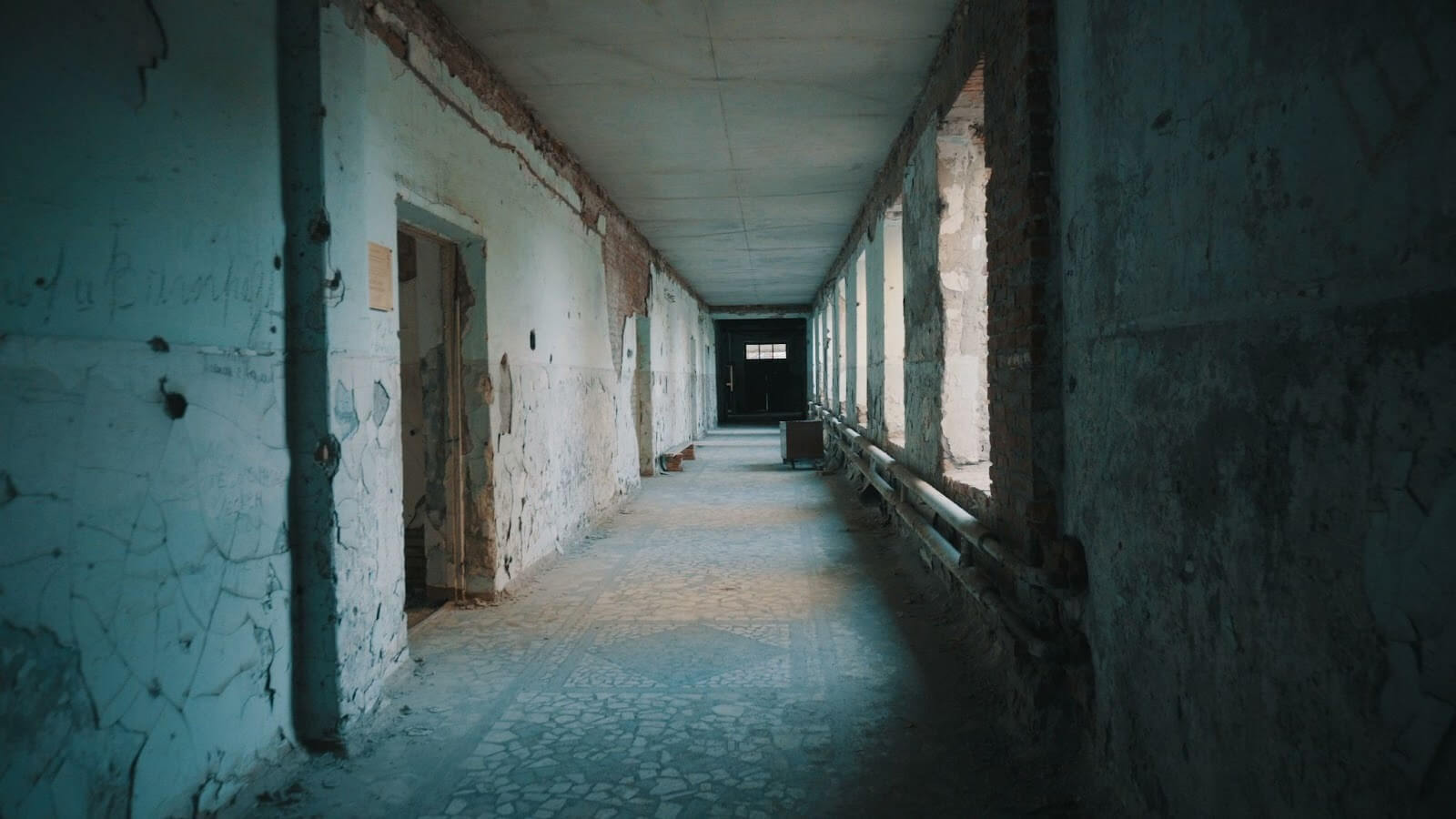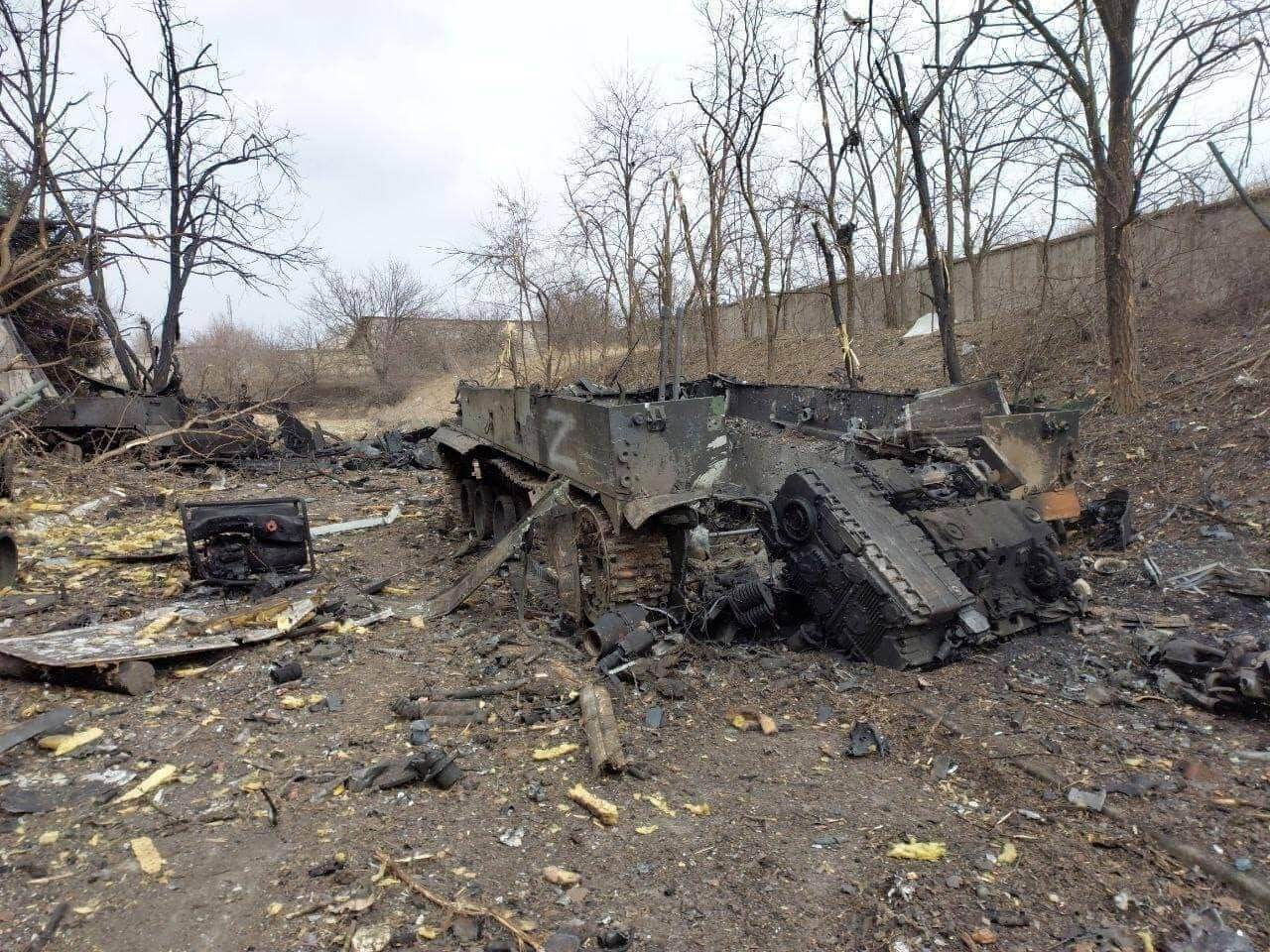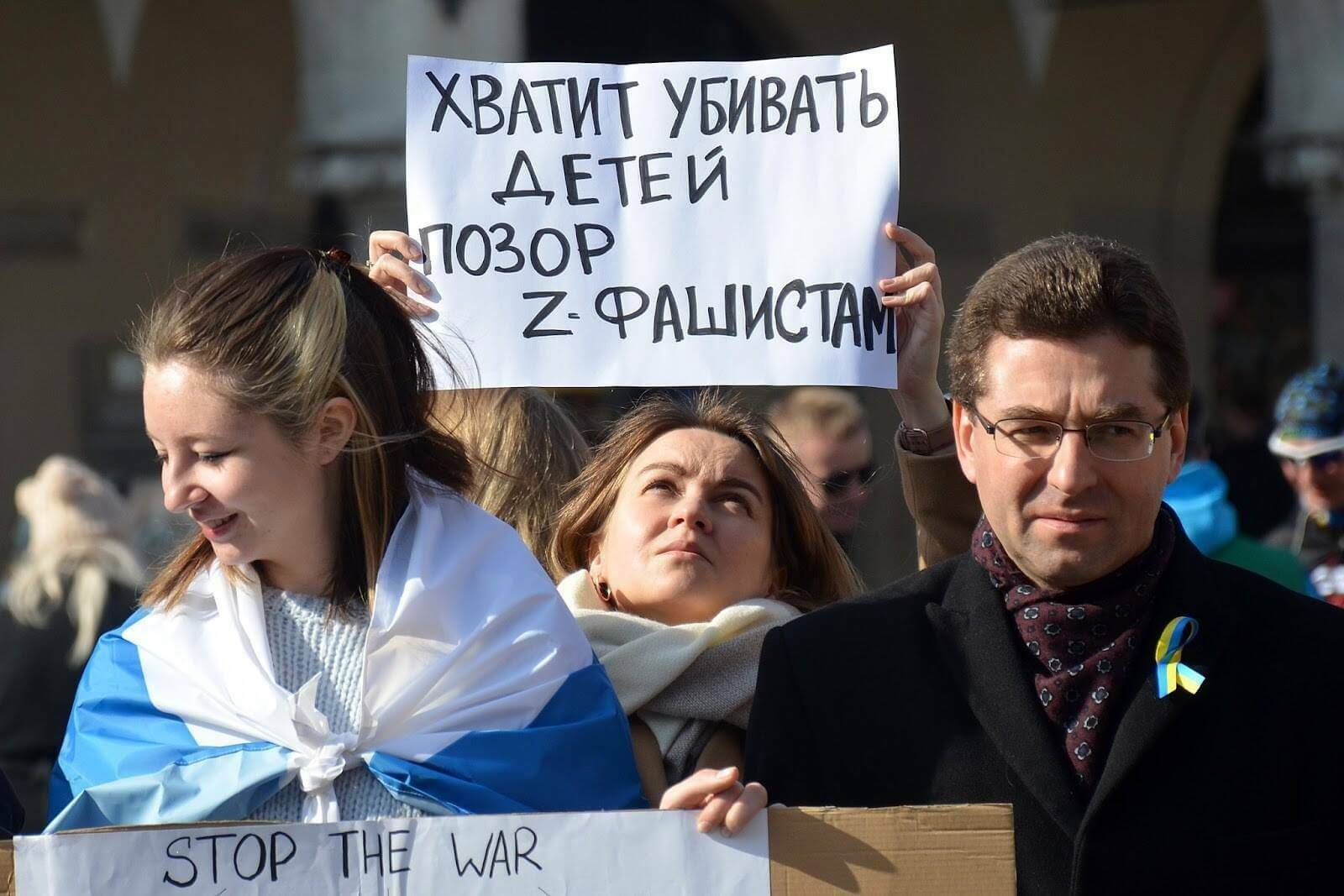Maria Lipman’s decision to indefinitely close the door on her Moscow apartment, her family’s home for 40 years, was abrupt. On February 24, 2022, Russia launched its full-scale invasion of Ukraine, provoking Lipman and her husband, within a single day, to leave their home and their homeland. Speaking over a year later, she said: “It’s still hard for me to believe that my husband and I, at our age, just got up and left, leaving behind our lives. … We closed the door with all our belongings there, all our books accumulating during our lifetime, and left.”

“The war was such a shock,” she says “which made us feel it is morally unacceptable to live in a country that is waging an atrocious war on its neighbor.”
The main emotion motivating the couple’s decision to leave was not necessarily fear. Lipman has had a long career as an editor and political analyst, overseeing Russian policy journals and magazines such as Pro et Contra, Itogi, and Exhenedel’ny Zhurnal, and writing for a variety of Russian and U.S. publications including the Washington Post and the New Yorker. In this capacity, she has observed and been critical of what she describes as the evolution of Putin’s “outright dictatorial regime.” But, at that early stage, Lipman says she probably would not have been considered an anti-government activist or someone who might have been subject to targeted government repression. Unlike many others who have left Russia since February 2022, she was not running from fear of prosecution. Rather, she explains, “it was an emotional decision.” For Lipman, her government’s actions against Ukraine meant that staying in Moscow was a moral impossibility. “The war was such a shock,” she says “which made us feel it is morally unacceptable to live in a country that is waging an atrocious war on its neighbor.”
In May 2023, Lipman spoke to the Nanovic Institute for European Studies from her relocated home in Chicago, sharing her reflections on her experience leaving Russia and being a Russian abroad in the context of the ongoing invasion of and war in Ukraine. In the U.S., she has continued to edit and write about developments under the Putin government and what they mean for Russia, Ukraine, and the world. She is currently a resident fellow of the Institute for European, Russian, and Eurasian Studies’ Russia Research Initiative at George Washington University where she was in charge of the PONARS Eurasia podcast and serves as chief editor of Russia.Post. In the spring of 2023, she co-authored an article for Foreign Affairs with Michael Kimmage, “Wartime Putinism: What the Disaster in Ukraine Has Done to the Kremlin—and to Russia,” and recorded a podcast conversation with the same publication reflecting on the relationship between Putin and his people.
Lipman variously describes herself as a migrant and an émigré, recognizing the contested nature of how to describe those who have left or fled Putin’s Russia and acknowledging what she describes as the entirely justified status of Ukrainians abroad as this war’s refugees. From this perspective, she discusses her nation’s slide into dictatorship, the complex “constellations” within public opinion in Russia, and some of the experiences of the hundreds of thousands of Russians who, like her, are living abroad with little prospect of returning home.
Marching toward a dictatorship
Lipman visited the University of Notre Dame in April 2023 as a discussant at the launch of After Violence: The Beslan School Massacre and the Peace that Followed (Oxford University Press, 2023) by Debra Javelin, associate professor of political science and faculty fellow of the Nanovic Institute and the Kellogg Institute for International Studies. Her comments on Javelin’s book provide a starting point for understanding Lipman’s analysis of the political, social, and military crisis now playing out in Russia. Lipman described the government response to the 2004 massacre in the north Caucasus town of Beslan as a turning point in the Putin government’s consolidation of uncontested power. Lipman explained that in the wake of this tragedy — a siege by Chechen terrorists and botched rescue operation by Russian security forces that ended with the deaths of 333 people, including 186 children — the authorities in Moscow used the massacre as cover for implementing significant undemocratic political reforms, such as the cancellation of gubernatorial elections in favor of a system of direct appointment. With no explanation as to the connection between the horrific events in Beslan and Russia’s electoral process, Putin imposed what Lipman describes as “an egregious restriction and infringement on people’s right to vote.”

Lipman sees the government’s response to mass anti-Putin protests in late 2011 and early 2012 as a perhaps even more significant step towards the concentration of power in the Office of the President. The wave of protests against electoral fraud and other undemocratic government reforms, she explains, was followed by a crackdown on rights and freedoms, including of assembly and the press. “The government,” Lipman says, “was sending an unambiguous message that oppositional, political activism would not be tolerated.”
This growth of repressive authoritarianism, Lipman says, has intensified over the last decade and has evolved into an “outright dictatorial regime” since the full-scale invasion of Ukraine. In 2023, protesting against the government in Russia is extremely dangerous. Street protesting, according to Lipman, is now out of the question and anyone who dares to stand in public with a protest sign will certainly be arrested and subjected to a system of increasingly harsh punishments and lengthening sentences. While some individual instances of public protest do still happen, these are vanishingly rare. Lipman explains, “intimidation works; of course, it does.”
“There have been brief periods here and there,” she says, “but, overall, Russia’s is a history of very strong dominance of the state; an omnipotent state and a powerless people.”
In its repression of anti-Putin protests, the Russian government now heavily polices and punishes both words and deeds. Russian citizens, Lipman says, are being arrested for social media posts or other expressions of opinion that are construed as critical of Putin or of the war against Ukraine. “It’s not even action,” she explains, “it’s mere words,” and, in many cases, the charges levied often have tenuous connections even to those words. Lipman refers to the example of the theatre director Yevgenia Berkovich and the playwright Svetlana Petriychuk, who have been in pre-trial detention since their arrest in May 2023 on charges of “justifying terrorism.” Their play Finist, the Bright Falcon depicts the online recruitment of Russian women to marry Islamic State fighters in Syria, which state prosecutors allege “romanticizes, justifies, and glorifies terrorists” and promotes an “ideology of radical feminism.” Lipman pointed out that the play was first staged in 2020 and has received numerous prestigious awards; yet, it is only now that its creators are being held for charges that Berkovich, in a statement before the court in July 2023, described as “mysterious and unknown.”
For Lipman, the paucity of widespread political opposition in Russia today sits within a much longer historical context than recent socio-political developments. Mass anti-government mobilization, she admits, is difficult to achieve in a country with a vast geography and low population density, where the socio-economic and political differences between large cosmopolitan cities and poorly connected rural regions can be significant. For Lipman, however, the more important causation is a history of governments over the centuries — reaching back through the Russian imperial and Soviet eras — that have strongly discouraged public solidarity and political activism. “There have been brief periods here and there,” she says, “but, overall, Russia’s is a history of very strong dominance of the state; an omnipotent state and a powerless people.” In the Putin era, she explains, the government has been reasonably tolerant of mobilization around local problems, particularly in the area of social and environmental activism but, over time, the vast majority of Russians have heeded the message that national political activism will not be tolerated. The legacy of the omnipotent state, Lipman explains, “is not easy to overcome and this pattern of governance was gradually reinstated by Putin himself.”
Public opinion in Russia: Constellations of perceptions
Despite her assessment of Russia’s lack of public activism, Lipman is careful to emphasize that public opinion in Russia is far from homogenous. Even within that majority of the population that is, variously, supportive or tolerant of the war against Ukraine, Lipman identifies “all kinds of different perceptions and constellations of perceptions.” Some of these differences in opinion on the war fall along some obvious lines — more support for the war among older and more rural populations, as opposed to the more critical younger Russians and urban dwellers — but Lipman points out that there are additional layers of complexity that are specific to the Russian context.

There are constituencies within Russia, Lipman explains, who see themselves as completely at odds with those critics of the war mentioned above — but for a variety of reasons. She identifies the strong criticism from so-called “military correspondents” of Russia’s military tactics. These media pundits are critical of how the war is waged, Lipman explains, “not from an anti-war position, but because [they believe] the war is not decisive enough, not efficient enough; it should be even more atrocious.” Their criticism tends to be reserved for military generals, rather than Putin himself. Perhaps more widespread is a sentiment in Russia that Lipman and Kimmage, in their article for Foreign Affairs, described as “anti-anti-war: people who may not necessarily be pro-war but are strongly disapproving and resentful of those who are unpatriotic and probably on the side of Ukraine, who would not stand behind [the Russian] army in any way.” Watching in horror as the toll of Russian deaths in Ukraine mounts, those who are anti-anti-war place the blame not on the Putin government or military, but with their compatriots who are either failing to support the war or are objecting to its continuation. While these Russians might not have been in favor of Russia’s actions in Ukraine, they still believe Russia cannot be defeated.
Lipman notes a significant portion of the population in Russia that is dependent on the government, whether for welfare and other kinds of state support or for employment. Smaller localities in the Russian provinces, she explains, where incomes and education levels tend to be lower rely upon government subsidies and demonstrate commensurate support for Putin’s government and the war effort. To illustrate this, she refers to reports of a community in an isolated, rural region where people are donating portions of their already very limited funds to collections for the army. In addition, Lipman notes that more than 50 percent of the Russian population is, in some way, on the government payroll or depending upon — and currently benefitting from — the military-industrial complex. In this group, she includes government officials, those who work in state industries, and the military with their families; Lipman intimates that their support for the war has motivations that go beyond an ill-informed acceptance of state propaganda.
On the topic of propaganda, Lipman recognizes that in Russia there are certainly those who obtain most, if not all, of their information from state television, the mouthpiece for government propaganda. However, she challenges the idea that Russia’s citizens are entirely at the mercy of state messaging, cut off from alternative sources of information that might be available from outside of the country. Lipman says, “It is a huge oversimplification to believe that access to information is a crucial factor in shaping a person’s perceptions.” Just as in the United States or many other parts of the world, Lipman believes that most Russian citizens exercise confirmation bias, choosing news sources that will confirm their existing beliefs rather than change their perspective. For example, Lipman says that accessing emigre Russian media through a VPN is something the majority of Russians would be able to do quite easily, and yet mere access to such sources does not appear to have a significant impact on majority opinion. Instead, Lipman explains, absent political opposition, Russian politicians and the Kremlin have a relatively easy task: “tapping into preexisting perceptions and reinforcing them, [which] include distrust, suspicion, increasing resentment, and hostility toward the West, which did not appear out of nowhere or just during the past year.”
Within the constellation of perceptions in Russia, Lipman identifies the most significant majority opinion as one that neither supports nor opposes, but withdraws from the war against Ukraine. She owns that this option is not possible for those who are directly affected by the war, especially the young men drafted and sent to the front and their families, typically from the poorer, rural provinces. But when the news from the front is so “disquieting,” Lipman explains, “people in Moscow or St. Petersburg, if they are opposition-minded, do have an opportunity to pretend that this is a distant war that does not have anything to do with [them.]”
The Russians who leave

There is another constituency of Russians that comprises its own constellation of perceptions, experiences, and motivations: those who have left Russia since February 2022, a figure that conservative estimates currently place between 500,000 and 700,000. Like Lipman, many of these individuals and families moved abroad as an act of protest against an unjust war; others fled out of fear of arrest for disloyalty, and a significant number, particularly since the announcement of a “partial” military mobilization in September 2022, are avoiding the draft. In giving her impressions of Russians’ experiences moving and living abroad, Lipman emphasizes that Ukrainian refugees are and should be a priority in terms of how they are received and supported elsewhere in Europe and beyond. Her illustration of some of the challenges encountered by Russian emigrés, however, forms an important part of the picture of how ordinary civilians have been affected by Russia’s war.
“Given how vast the regime has evolved as a dictatorship,” she comments, “I can very much expect that the freedom of travel that has remained in Russia, even after nearly all other freedoms were encroached upon or eliminated, may be encroached upon as well.”
Lipman knows many personal acquaintances who, like her, made an emotional and spontaneous decision to leave Russia immediately after the full-scale invasion of Ukraine. Their decision was influenced by rumors that Russia’s borders would be sealed and fears about separation from loved ones. Although the country’s borders have stayed open, there remain many barriers to travel abroad, some of which preceded February 2022. Russians already needed visas to enter most countries of the world, including those in the European Union. Without an existing and valid visa, the list of countries that will grant admission is short. Many émigrés, including Lipman and her family, took advantage of visa-free travel between Russia and Armenia, using that central Asian republic as the first stage of a stepped migration.
The existence or lack of a safety net abroad — friends, contacts, and prospects of employment — has been another variable in recent Russian émigrés’ experiences. Lipman notes that she and her husband have been lucky in this regard, but the majority of those who have left, many young and urgently fleeing the military draft, have not had these advantages. In the immediate announcement of the partial mobilization, Lipman says, there were roundups and cases of people being grabbed in the street and sent to the frontline after only a few days or weeks of inadequate preparation and training. Within a week of Putin’s announcement, the Associated Press reported, close to 200,000 Russians had fled to Georgia, Kazakstan, and Finland, often by car, bicycle, or on foot. Although the pace of this mobilization declined after these initially chaotic weeks, Lipman says that young Russians who receive a draft notice are going into hiding within the country’s boundaries since they can no longer cross the border. She also notes an alarming, albeit vague, statement by Putin in late May 2023 in which he gestured toward tackling the outflow of Russians from the country. “Given how vast the regime has evolved as a dictatorship,” she comments, “I can very much expect that the freedom of travel that has remained in Russia, even after nearly all other freedoms were encroached upon or eliminated, may be encroached upon as well.”
While the difficulties encountered in relocation might vary, these emigrants face a shared challenge as Russians abroad against the backdrop of their nation’s almost universally condemned war against Ukraine. Lipman notes that the reception Russians receive can depend upon their host country’s historic relationship with Russia and proximity to the current conflict. Lipman’s own experience in the U.S. and, to her knowledge, that of her compatriots in Western Europe, especially Germany, have been positive. Russians living or moving to the Baltic countries, however, which were annexed to the Soviet Union following the Second World War, have encountered significant hostility. She highlighted Latvia as one country that has become increasingly difficult to live in as a Russian, despite the existence of a robust pre-2022 Russian immigrant population, particularly in the capital Riga. Lipman describes this animosity as emanating not from people in the streets, grocery stores, or communities, but from rhetoric and policy directed by politicians, the media, and a nationalist intellectual elite. Soon after the full-scale invasion was launched, the Latvian government reversed its policy of granting residence permits to foreigners who owned property in Latvia. Lipman laments the complexity of such a situation given that Russians have comprised Latvia’s largest and most noticeable minority group for generations.
“The First Casualty of War is Truth”
At the end of the conversation, Lipman reflected on the question of how people outside of Russia and Ukraine might most effectively engage with reporting and information on the war. Although she is a staunch advocate of discussing, debating, and staying informed, Lipman closed with a reference to “the fog of war.” Recalling the concept that “the first tragedy of war is truth,” Lipman explained that objective coverage of the war is a huge problem, particularly given the international media’s lack of access to Russia, its government, military, and general population.
In the U.S., Lipman praised the “tremendous” work of journalists at the New York Times, the Washington Post, and the New Yorker for the stories they have uncovered and shared of the war’s impact on the people of Ukraine. But, any attempt to achieve the same degree of access to Russian sources is prohibitively dangerous. Lipman knows of many Western journalists who had lived in and written about Russia for many years and are anxious to return and report, but the Putin administration’s treatment of dissidents and foreigners means that editors in the U.S., Europe, and elsewhere, are largely refusing to make such assignments. The Russian authorities’ arrest and detention of Wall Street Journal correspondent Evan Gershkovich since March 2023 on charges of espionage, the first such case against an American reporter since 1986, has proven to be an effective deterrent. In this context, Lipman fears that until international reporters and analysts can be in Russia and get a picture of what it feels like on the ground there, comprehensive coverage of this war is impossible.
Until such time, it falls to Lipman and others like her to continue speaking up for truth, even if that means leaving everything else behind.